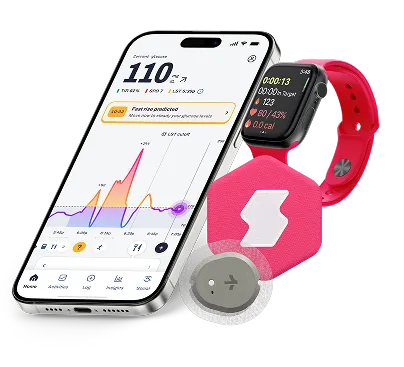Black beans, often praised for their versatility and nutritional value, play a significant role in many cuisines around the world. However, what sets them apart is their remarkably low glycemic index (GI), making them an excellent choice for individuals managing their blood sugar levels.
According to data from the United States Department of Agriculture (USDA), black beans boast a GI of around 30, which positions them as a favorable option for those with diabetes seeking to maintain stable glucose levels.¹
In this article, we will explore the benefits of incorporating black beans into your diet, shedding light on their GI and how they can positively impact your overall health.
Sign up to be the first to know about special offers and exciting Signos news.
Glycemic Index Table
To calculate the glycemic index (GI) and glycemic load (GL) for black beans, we'll start with the nutritional data from the United States Department of Agriculture (USDA) for a 100g serving of cooked black beans.¹
The glycemic index measures how quickly a carbohydrate-containing food raises blood glucose levels compared to a reference food (usually glucose or white bread), which has a GI of 100. However, the GI of black beans can vary depending on factors like cooking time and other foods consumed alongside.
Since the GI of black beans can vary, we'll use an approximate GI of 30 for cooked black beans.²

Nutritional Facts
Black beans are a nutritional powerhouse packed with protein, fiber, and essential vitamins and minerals. A 100g serving of cooked black beans provides approximately 21g of protein, 8.86g of carbohydrates, 2.33g of fiber, and essential nutrients such as iron, magnesium, and folate.¹ This nutrient-rich profile makes black beans an excellent choice for promoting satiety, supporting heart health, and maintaining stable blood sugar levels.
The nutritional information below is for 100 g of black beans.¹
Nutritional Facts

Are Black Beans Good for Weight Loss?
Black beans can be a valuable component of a weight loss plan due to their nutritional profile and satiating properties. They are rich in dietary fiber and protein, both of which play essential roles in promoting feelings of fullness and reducing overall calorie intake. Additionally, black beans have a relatively low glycemic index (GI), which means they have a minimal impact on blood sugar levels, helping to stabilize energy levels and reduce cravings for high-sugar snacks.
Studies have shown that incorporating beans like black beans into your diet can support weight loss efforts. For example, a study published in the journal "Obesity" found that individuals who consumed beans regularly as part of a reduced-calorie diet experienced greater weight loss and improved fat loss compared to those who did not include beans in their diet.⁴ Furthermore, the high fiber content in black beans can help regulate digestion and prevent overeating.
Are Black Beans Safe for People Living with Diabetes?
Black beans are generally considered a safe and beneficial addition to the diet of individuals with diabetes. They have a low glycemic index (GI), which means they cause a slower and more gradual increase in blood sugar levels when consumed. Additionally, black beans are rich in dietary fiber, which can help regulate blood sugar levels by slowing down the absorption of carbohydrates. Furthermore, they provide a good source of plant-based protein and essential nutrients like magnesium, which can contribute to improved insulin sensitivity.
According to the American Diabetes Association, incorporating legumes like black beans into a diabetes-friendly diet may help with blood sugar control and reduce the risk of cardiovascular disease.³
Better health starts here.
Sign up for tips and insights that work for you!
Allergies
Allergies to black beans are relatively rare but can occur primarily as a result of the proteins found in beans. Allergic reactions to black beans may include symptoms such as hives, digestive issues, or even anaphylaxis in severe cases.
It's essential to be aware of potential allergies to black beans and consult with a healthcare professional if you suspect an allergic reaction, as they can perform tests to confirm allergies and provide guidance on allergen avoidance.

References
References
- USDA FoodData Central. (2019, Decemberl 16). Food Details - Beans, dry, black. Retrieved from https://fdc.nal.usda.gov/fdc-app.html#/food-details/747444/nutrients
- The University of Sydney. (2023, May 1). Glycemic Index – Glycemic Index Research and GI News. https://glycemicindex.com/
- American Diabetes Association. (n.d.). What superstar foods are good for diabetes? https://diabetes.org/food-nutrition/food-and-blood-sugar/diabetes-superstar-foods
- Papanikolaou, Y., & Fulgoni, V. L., 3rd (2008). Bean consumption is associated with greater nutrient intake, reduced systolic blood pressure, lower body weight, and a smaller waist circumference in adults: results from the National Health and Nutrition Examination Survey 1999-2002. Journal of the American College of Nutrition, 27(5), 569–576. https://doi.org/10.1080/07315724.2008.10719740




.svg)
.svg)
.svg)
.svg)
.svg)
.svg)
.svg)
.svg)
